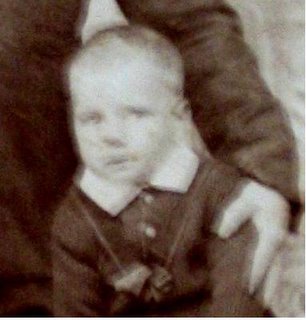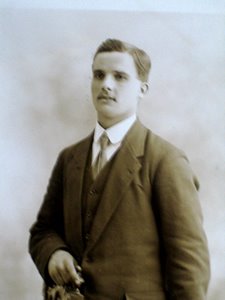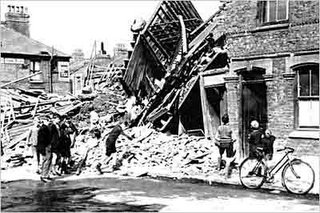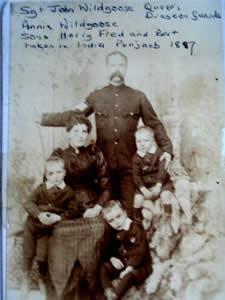Walter and Bert
 Many of Walter's letters talk about the relationship between Walter and his brother Bert. Once the family was separated and the boys sent to Sheffield, Bert represented family to Walter. With father John in the workhouse infirmary, mother Annie and brother Fred in Folkestone, Harry off who-knows-where, and little sister Annie in Whitley Bay (or was she??), the "two Goslings" had to fend for themselves where family ties were concerned.
Many of Walter's letters talk about the relationship between Walter and his brother Bert. Once the family was separated and the boys sent to Sheffield, Bert represented family to Walter. With father John in the workhouse infirmary, mother Annie and brother Fred in Folkestone, Harry off who-knows-where, and little sister Annie in Whitley Bay (or was she??), the "two Goslings" had to fend for themselves where family ties were concerned.The only picture we have of Bert is this one taken in India before the devastating sunstroke and the family split-up. And the earliest photo we have of Walter is this one taken in 1912 at age 22. Wonder if they ever had a picture taken together? It's a pity we don't have it.
Early in our correspondence, Walter gives his first account of Bert's death to me:
 Yes Mary, when you mention World War I. Fancy being now 65 years ago, and yet I can remember many things that happened. I laid in hospital having been brought home from France in 1915. I went to Clopton War Hospital near Stratford on Avon. I picked up the morning’s paper to read the casualty list which was issued each day. It was on the 9th May 1915, that I read of my poor brother Bert had been killed in action. I was 25 years old at the time and Bert was 26 years old. He was a Lance Corporal in the Black Watch. His regiment went straight to France from Meerut in India, the Meerut Division. I was very sad for weeks over reading the news. We had been great pals at school in Sheffield as school boys. It happened at the Battle of Aubers Ridge in Festubert. Poor Bert! So if he had lived he would now be 90 years of age. The flower of Youth was squandered away of the all the participants. And still they are remembered after all these years despite another war has taken place, not counting all the little side shows around the British Empire (as it then was) which is no more. I thought I would recount this incident to you Mary, although it was hard to do so.
Yes Mary, when you mention World War I. Fancy being now 65 years ago, and yet I can remember many things that happened. I laid in hospital having been brought home from France in 1915. I went to Clopton War Hospital near Stratford on Avon. I picked up the morning’s paper to read the casualty list which was issued each day. It was on the 9th May 1915, that I read of my poor brother Bert had been killed in action. I was 25 years old at the time and Bert was 26 years old. He was a Lance Corporal in the Black Watch. His regiment went straight to France from Meerut in India, the Meerut Division. I was very sad for weeks over reading the news. We had been great pals at school in Sheffield as school boys. It happened at the Battle of Aubers Ridge in Festubert. Poor Bert! So if he had lived he would now be 90 years of age. The flower of Youth was squandered away of the all the participants. And still they are remembered after all these years despite another war has taken place, not counting all the little side shows around the British Empire (as it then was) which is no more. I thought I would recount this incident to you Mary, although it was hard to do so. Walter mentions Bert's death no fewer than six times in his letters to me, more than any other single incident of his life. What happens when half of a two-against-the-world partnership dies? Walter was deprived of growing old with his dear brother, of being uncle to Bert's children, of countless conversations and reminescences. After all they'd been through together, he felt the loss of Bert keenly throughout his life.



